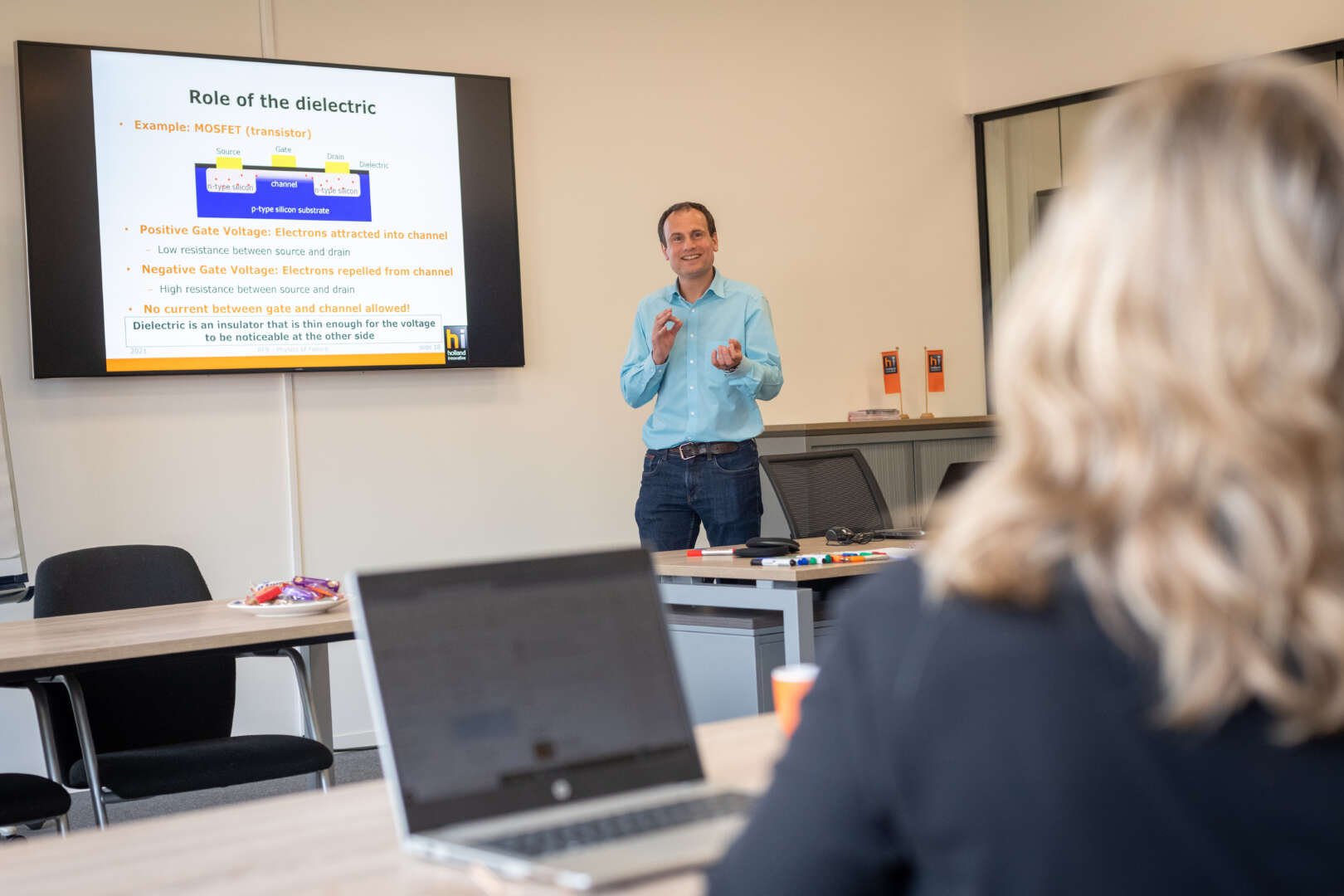- Failure cause, failure mechanism, failure effect. Thinking in terms of failure mechanisms.
- Risk analysis (FMEA) of a test setup and component; defining failure mechanisms.
- Fatigue, Material behavior, types of fracture, Hertzian stresses, static and dynamic strength
- Wear-out mechanisms - tribology. Pitting, fretting, cavitation, erosion, lubrication, contamination, sealing.
Course information
- 4 days
-
19 & 20 November and 1 & 2 December
Investment
The investment is €3.150, (excl. VAT) per participant.
Included are the four training days, a syllabus of the course material, the book ‘Advanced Engineering Design; Lifetime performance and Reliability’, refreshments and daily lunches.
Additionally, participants can join the Reliability User Group four times for free (valid until one year after the last day of this course).

Curious?
Talk to our academy advisorRF9 - Physics of Failure
The participants of the course RF9 Physics of Failure acquire detailed knowledge on failure mechanisms in products and their impact on reliability.
Thinking in functions and failure mechanisms is essential during the Product Creation Process (PCP). Loss of functionality implies the failure of construction or design. This can be prevented in numerous ways. Insight into the physics of failure contributes to the Product Creation Process during all development phases of reliable systems.
The course focuses on the identification, understanding and modeling of failure mechanisms. Based on appropriate design measures, the probability failures is minimized. After this, the Reliability can be predicted, accounting for variation due to design, manufacturing and user.
You will learn to think in terms of failure mechanisms during development and insight into failure mechanisms in mechanical, mechatronics, and electronic systems. Topics covered include: Fatigue, Wear-out, Degradation, Connections, Electrical failures and modeling and prevention of failure mechanisms.

With this course you’ll learn:
- Practical and detailed knowledge about failure mechanisms in products and their impact on reliability
- How to apply the gained knowledge immediately to design for reliability (DfR) and product improvement projects to prevent failures
Teaching professionals.

Dr. Anton van Beek
Teacher at TU Delft works at the Department of Precision and Microsystems Engineering
Dr. Ir. Coen Smits
Scientific Director ReliabilityCourse: Physics of Failure.
Outcome
The course Physics of Failure focuses on the identification, understanding and modeling of failure mechanisms to prevent failures and improve reliability. The knowledge gained will be applicable during the Design for Reliability and product improvement projects.

Identifying critical components in systems and taking the necessary measures is an essential skill to avoid failures and to achieve a reliable design. A component can fail in many ways and understanding the underlying causes of failure and failure mechanisms, is a prerequisite for a proper design. Not only does it save time and money during product development, it also prevents dissatisfied customers and users.
Physics of Failure
Yes, I'm joining.
What you’ll learn.
Block 1 - day 1 & 2
What you'll learn on day 1 and 2 of the course
Block 2 - day 3 & 4
What you'll learn on day 3 and 4 of the course
- Degradation - chemical reactions. Temperature, humidity, contamination, oxidation, crystallization, ozone, UV radiation. Degradation models such as Arrhenius, Peck, Coffin-Manson, Power-law.
- Failure of connections, bolts, inserts, glues, welds.
- Electrical failures, such as short circuit, burn-in, contact resistance, SN-whiskers, EMC, ESD.
- Design guidelines, safety factors and deratin
Practical information.
For whom
Certificate
At the end of the last session, you will receive a declaration of participation. Moreover, the training can serve as one of the modules to obtain the Certificate Reliability Engineer according to VDI 4002.
The Reliability Foundation Program is a post-graduate education, focusing on the practical aspects of reliability engineering. The program has been developed in accordance with VDI 4002 reliability guidelines in collaboration with the University of Stuttgart and consists of several modules that will result in a VDI reliability engineer certification.
Location & Dates
Location
Eindhoven – High Tech Campus 29
Dates 2026
19 & 20 November and 10 & 11 December
Group size
Maximum number of participants: 16.
Relevant courses.
HI-RF 01 Life Data Analysis and Reliability Testing
Reliability System EngineeringPredict the reliability of your product based on field and test data.

- 6 days
HI-RF 02 System Reliability
Reliability System EngineeringBecome a reliability engineer to perform reliability and risk analyses of complex systems.

- 5 days
HI-RF 06 Software Reliability
Reliability System EngineeringBecome a software reliability engineering professional capable of supporting the creation of Reliable Software for complex systems.

- 3 days
HI-RF 10 Problem Solving through Statistical Engineering
Reliability System EngineeringBecome a complete problem solver by using Statistical Engineering method.

- 5 days
- October 1 - October 1

.jpg?width=200&name=Holland%20Innovative%20summer%20academy%20-%20Project%20Management%20Masterclass%202%20(2).jpg)